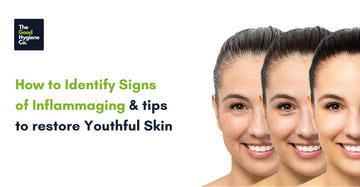As global life expectancy continues to rise, the challenge of maintaining youthful, healthy skin becomes more complex. One major culprit behind this skin decline is inflammaging which means a persistent, low-grade inflammation that is associated with aging.
Inflammaging is a condition that triggers skin changes that speed up the appearance of aging marks on the face, making the skin look older than it truly is. Yes! An early aging sign is what we usually call this as.
Inflammaging results from an ongoing inflammatory response that builds up over time. This chronic inflammation gradually damages tissues and is linked to conditions such as dementia, arthritis, and type 2 diabetes. It also has a profound effect on the skin, contributing to fine lines, wrinkles, and sagging as early as 20’s and in some even at younger age.
What Causes inflammaging?
The skin, as the body's largest organ, is highly susceptible to both internal and external factors that trigger inflammation. As we grow older, our immune system’s ability to regulate this inflammatory response weakens, leading to the persistent presence of pro-inflammatory substances in the bloodstream.
Key contributors to inflammaging include:
- UV radiation: Exposure to sunlight triggers oxidative stress, accelerating aging and inflammation.
- Pollution: Environmental toxins weaken the skin barrier, causing prolonged inflammation.
- Unhealthy lifestyle choices: Poor diet, lack of exercise, and smoking worsen inflammation symptoms.
- Skin barrier impairment: As we age, the skin’s natural protective layer becomes less effective, making it prone to irritation and inflammation.
Identifying the Signs of inflammaging
Recognizing inflammaging early can help you adopt strategies to slow down the process.
Watch out for these telltale signs:
1. Persistent Redness and Irritation
Chronic inflammation can cause redness, especially on sensitive areas like the cheeks and nose.
2. Dry, Flaky Skin
A weakened skin barrier allows moisture loss, resulting in dryness and irritation.
3. Fine Lines and Wrinkles
Chronic inflammation accelerates collagen breakdown, making aging marks on the face more noticeable.
4. Uneven Skin Tone
Inflammation often leads to hyperpigmentation, dark spots, and blotchy skin.
5. Reduced Elasticity
Long-term inflammation damages skin fibers, causing sagging and a tired appearance.
Tips to Restore Youthful Skin
Tips to Restore Youthful Skin and Combat inflammaging Fortunately, there are effective ways to manage inflammation and promote healthy, radiant skin.
1. Adopt an Anti-Inflammatory Diet
Consuming foods rich in antioxidants and omega-3 fatty acids can reduce chronic inflammation and improve skin health. Focus on:
- Fatty fish (like salmon)
- Leafy greens
- Berries and citrus fruits
- Nuts and seeds
2. Incorporate Antiaging Skincare Ingredients
Look for skincare products that target inflammaging and boost skin repair. Key ingredients include:
- Niacinamide: Known to reduce inflammation symptoms and strengthen the skin barrier.
- Retinoids: Effective for minimizing aging marks on the face and promoting collagen production.
- Hyaluronic acid: Helps restore hydration, improving skin's youthful glow.
3. Use Sunscreen Daily
UV exposure accelerates inflammation and aging. Applying a broad-spectrum SPF daily protects the skin from environmental damage.
4. Maintain a Gentle Skincare Routine
Avoid harsh scrubs or over-exfoliation, which may worsen inflammation symptoms. Instead, opt for calming products containing ingredients like chamomile, green tea extract, and aloe vera. Always choose products that are free from chemicals and safe on skin.
5. Manage Stress and Prioritize Sleep
Chronic stress triggers cortisol production, increasing inflammatory response. Practice mindfulness techniques like yoga, meditation, or deep breathing to reduce stress levels. Getting sufficient sleep is equally vital as your skin undergoes repair and regeneration during rest.
6. Consider Supplements for Skin Health
Antiaging supplements containing collagen peptides, vitamin C, and zinc can promote healthy skin and reduce aging marks on the face. Additionally, probiotics may improve gut health, indirectly reducing inflammation symptoms.
Conclusion
Inflammaging is a silent contributor to aging, affecting both the skin and overall health. By recognizing inflammation symptoms early and adopting targeted anti-inflammatory strategies, you can help protect your skin from premature aging. Focus on lifestyle improvements, skincare solutions, and nutrition to maintain radiant, youthful skin well into your later years.
References:
1. Inflammaging and the Skin -
https://www.sciencedirect.com/science/article/pii/S0022202X20322946
2. Inflammaging in Dermatology: A New Frontier for Research – 2021 Feb - https://pubmed.ncbi.nlm.nih.gov/33538570/
3. Inflammaging in skin and other tissues - the roles of complement system and macrophage – 2014 - https://pubmed.ncbi.nlm.nih.gov/24853681/
4. The Skin and Inflamm-Aging – 2023 Nov - https://pubmed.ncbi.nlm.nih.gov/37997995/
5. Inflammaging: a new immune-metabolic viewpoint for age-related diseases – 2018 Oct - https://pubmed.ncbi.nlm.nih.gov/30046148/






